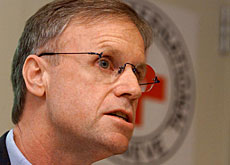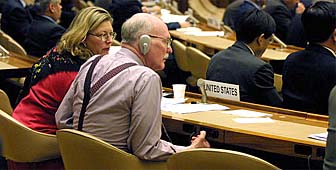ICRC targets biological weapons

The International Committee of the Red Cross (ICRC) has launched a major initiative calling for stronger controls on existing and future biological weapons.
The ICRC appealed to governments, scientists and industry to prevent biotechnology falling into the wrong hands.
The organisation said it had been prompted to launch its initiative by a combination of the rapid advances in biotechnology and the stalemate in negotiations on strengthening the Biological Weapons Convention.
“The world cannot afford the luxury of waiting for an end to the impasse,” said Peter Herby, head of weapons issues at the ICRC’s legal division.
Launching the initiative, he warned that biological weapons production was becoming easier, more attractive and deadlier.
Weapon of choice
“Germs may well replace bullets as the weapon of choice,” he said, adding that some 200,000 drugs were rejected by the authorities every year because they were considered too toxic.
The know-how to make them and put them to hostile use is nonetheless readily available, either by mail order or over the Internet.
The launch of the appeal at the ICRC’s Geneva headquarters followed a two-day international meeting, held behind closed doors in Montreux.
At the meeting, ICRC president Jakob Kellenberger appealed to politicians and scientists for a “reaffirmation of norms against biological weapons and for better controls on potentially dangerous biotechnology”.
The ICRC is calling for existing international conventions prohibiting the use or transfer of biological agents – notably the 1925 Geneva Protocol and the 1972 Biological Weapons Convention – to be respected, and for transgressors to be prosecuted.
It is also urging all political and military authorities, the scientific and medical communities, and the biotechnology and pharmaceutical industries to “work together to subject potentially dangerous biotechnology to effective controls”.
Speedy backing
Ultimately, the ICRC would like to see its initiative lead to a political declaration by countries as a statement of intent to combat biological weapons.
“It would not be a treaty. There is no reason why it can’t be adopted in a year or so,” said Herby.
The timing of the Montreux meeting and the resultant initiative is significant, since states’ minds are focused on November’s resumption in Geneva of the Review Conference of the Biological Weapons Convention (BWC).
This is aimed at producing an additional protocol on verifying compliance with the convention.
The talks foundered last December on US opposition to the protocol. Washington was opposed to independent external inspections of its facilities.
Countries are keeping their cards close to their chests ahead of the resumption of the Review Conference, but Herby said the ICRC initiative was well received by delegates in Montreux.
Code of conduct
However, significantly, there were no representatives of industry at the conference.
One of the ICRC’s key demands is that the scientific community and the biotech industry “adopt professional and industrial codes of conduct aimed at preventing the abuse of biological agents”.
Given that one of the reasons for the United States rejecting the protocol was to safeguard commercial secrets, this could be a stumbling block for the ICRC initiative.
However, Herby said that most companies and researchers would not want to be associated with such abhorrent weapons.
“Most scientists do what they do for the good of humanity,” he told swissinfo.
“We are not seeking to interfere with the freedom of research. We’re calling on scientists to think in advance about the possible abuses of their work.”
Fresh look
The ICRC is presenting the initiative as a fresh look at the biological weapons issue, similar to past efforts on landmines.
It says it is trying to get governments, scientists and industry to look at biological weapons not solely as a question of arms control, but also of international humanitarian law and public health.
“It’s an attempt to reframe the debate,” says Herby.
He said that another failure in the talks on an additional protocol to the BWC would not preclude acceptance by states of the ICRC initiative, since it is proposing issues that are separate from the protocol.
“We’re talking about measures that will complement the protocol – national legislation, codes of conduct for science and industry. These would have been necessary with or without an inspection regime,” he said.
swissinfo, Roy Probert in Geneva
ICRC is calling on political and military authorities to strengthen commitment to existing laws banning hostile use of biological agents.
It is demanding that scientific and medical communities and industry ensure that potentially dangerous biological knowledge is subject to stringent controls.
The conference on an additional protocol to the Biological Weapons Convention, allowing independent inspection visits, broke up in failure last December. Talks are set to resume in November.

In compliance with the JTI standards
More: SWI swissinfo.ch certified by the Journalism Trust Initiative

You can find an overview of ongoing debates with our journalists here. Please join us!
If you want to start a conversation about a topic raised in this article or want to report factual errors, email us at english@swissinfo.ch.